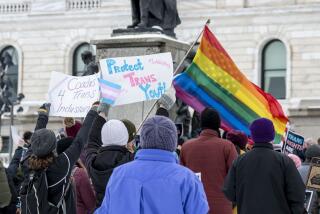‘Those Are Your Parents? What Happened?’ : Families: Multiethnic children adopted by whites say racial issues must be addressed-- because prejudice comes from all sides.
- Share via
Even with the best-intentioned parents, it is not easy growing up with a family of another color, say those who have done it. Prejudice, they say, comes from all sides.
Anthony Petronelli, 23, who was adopted as an infant, said he first noticed it when he was in kindergarten. “People said, ‘Those are your parents? What happened?’ People still make comments like that,” he said. “They say, ‘You’re Tony? I was expecting something different.’
“One of my friends was black. His parents liked me, but I’m not sure they liked my parents. I wasn’t allowed to go and play very much.”
Petronelli, who is biracial, believes that he is more open-minded as a result of growing up with white parents. If he had been raised by black parents, he believes that he might be more like his black friends at school, whose best friends were only blacks.
“At school, all the black people eat together. No one would try to sit down with us. I’d veer off and eat with white people. They wouldn’t.”
The movement to adopt transracially began in the 1970s with couples interested in zero population growth or who wanted to make a liberal statement, said Lois Ruskai Melina, author of “The Open Adoption Experience.” It evolved in the ‘80s with the rising number of infertile white couples who could not find healthy, white infants to adopt, she said.
Some of the first adoptees--now grown to adulthood--said they are better off having been raised with white parents than waiting for permanent homes in foster care.
Until she was adopted at age 12 by a white couple, Sandi Ililonga of Ypsilanti, Mich., said she had lived in 10 foster homes and two orphanages.
“One of the problems is where do you put a multiethnic kid? It was harder the older I got. It’s easier to place a 2-year-old than an 8-year-old who’s been put through the ringer, or a 10-year-old who has a firm grip on rejection,” said Ililonga, now a spokesperson for the Detroit-based National Coalition to End Racism in America’s Child Care System, which favors transracial adoption.
“When my parents adopted me, I just wanted to be a little white girl with blond hair and blue eyes. I knew I was a black child and people didn’t want me because of that. When my parents adopted me, they thought it was important to deal with that feeling and make it their top priority.”
Ililonga said her adoptive parents had a “wonderfully diverse” group of friends from many ethnic and socioeconomic backgrounds. “Whatever they couldn’t give me on their own, I could get from their friends.
“The family doctor was black,” she said. “I didn’t know black people could like opera. He taught me that. . . .
“Now families are realizing everything about that child must be addressed. If you have crossed an ethnic line to adopt, you very much are obligated to do whatever you can to help that child learn about himself.”
*
Sarah Jones, 23, of New Haven, Conn., said she regrets that her parents never made an issue of race. “What they ended up doing was try to ignore that I had a race, which was awfully confusing for a young child. I never fit in at all. I had problems feeling connected to my family and feeling that I would stay a member of my family.”
Jones, a multiethnic descendant of Cape Verde islanders, was placed with a white couple in Newport, R.I., after her biological mother, a victim of incest, gave her up for adoption.
“I was brought up in an atmosphere surrounded mainly by white people. My parents didn’t have any integrated type of relationships besides me.
“Everybody is racist to a point, including me, including you,” Jones said. “My parents have more problems with my race than should have been allowable.”
One time, she said, they refused to let her bring a black boyfriend to dinner because they “didn’t know him well enough.”
A graduate of Yale University who wants to open an adoption agency, Jones said parents who want to adopt transracially need counseling to be more sensitive to racial issues. “They don’t have to live and breathe their race, but they should make the effort to make sure their race is not ignored or trampled on.”
Jones no longer wishes that she had been raised in a family matching her own ethnicity, as she did a few years ago. “I love my parents,” she said. “I’m glad they adopted me. All parents have faults. Other ones would have some problems, too. Hey, I could have had my biological parents. That would have been gross.”
More to Read
Sign up for Essential California
The most important California stories and recommendations in your inbox every morning.
You may occasionally receive promotional content from the Los Angeles Times.










